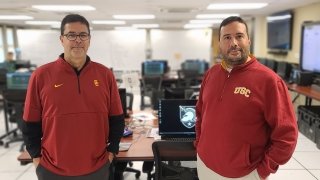Through a partnership dating back nearly a decade, two USC Rossier School of Education graduates have contributed to a transformation in how U.S. Military Academy (USMA) cadets are taught, introducing guided experiential learning initiatives into the high-stakes training environment.
Victor Castro MEd ’19 and Richard DiNinni EdD ’22 have spearheaded programs that blend virtual reality and game-based training technologies with research-based pedagogy, bringing classroom lessons to life as cadets apply newly acquired concepts and skills in leadership, marksmanship and navigation to real-world challenges in simulated settings.
“Whether it’s game-based on a laptop or handheld, or using virtual or augmented reality, we’re taking the real-world space and overlaying information that will support the cadets’ learning during the training event,” DiNinni explains.
DiNinni, an East Coast-based project director with the USC Institute for Creative Technologies, has for the past eight years been a visiting scientist at West Point. In that role, he spends much of his time collaborating with Castro, a two-time combat veteran now in a civilian position as deputy director and training instructor at the West Point Simulation Center, which uses modeling and simulations technology to create authentic learning environments. Drawing on their USC Rossier experience—DiNinni as a graduate of the Doctor of Education in Organizational Change and Leadership program and Castro of the Master of Education in Learning Design and Technology program—they explore how new educational technologies, combined with evidence-based practice, can support cadet training.
“It’s been a great partnership, in that we bring different strengths and experiences to the table but are both passionate about the same thing—developing new ideas and technologies to improve the learning outcomes for these cadets,” DiNinni says.
Among the first major systems DiNinni and Castro leveraged as part of their strategy to refine Simulation Center programs was a training tool used to enhance classroom instruction in military leadership. “When you have a young officer taking command of their first unit, they’re around 22, overseeing soldiers in their 30s with much more life experience, and suddenly they have to help these older soldiers through personal issues they haven’t experienced themselves,” DiNinni says. “This game-based simulation environment enables these cadets to interact with a virtual human playing the role of one of those older unit members and shows them the outcomes of their decisions.”
While lectures play an important role in establishing a knowledge base, simulated learning environments offer opportunities to heighten the engagement of a trainee, immersing them in challenging scenarios that enhance their preparation for the interpersonal encounters they will ultimately face, DiNinni and Castro explain. The use of technology-based training tools in the Simulation Center can also help the USC Rossier graduates hone their approach based on cadet performance and feedback. For example, each third-year cadet who went through the program was tested both before and after to evaluate the program’s impact on learning outcomes and identify gaps to be addressed.
Castro contrasts his own military training with the work he helps oversee at USMA. “When I was learning the M60 machine gun, I had to do everything in front of a drill sergeant who would yell at me if I failed once,” he says. “It was more negative learning. At the Academy, we have the cadets not only experience the learning, but understand why it’s important and then reinforce that by teaching someone else.”
Castro hopes he and DiNinni can play a role in increasing synergies between their alma mater and Castro’s employer—potentially including a partnership in which USC Rossier students and faculty work with USMA to help validate the learning applications.
“All aspects of what we learned at Rossier have easily transferred to what we do at the Academy,” Castro says. “Every time I start working on something with Rich, I tell him, ‘We’re doing exactly what we did in our programs.’ This is everything that the evidence-based education that came out of Rossier was telling us to do.”




